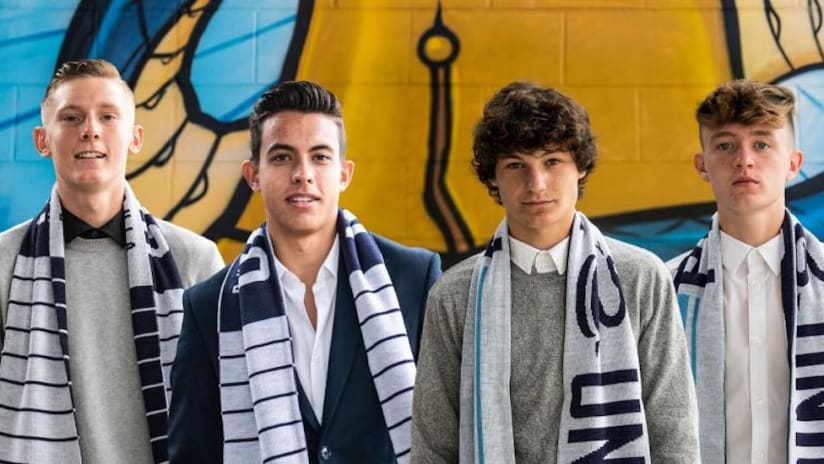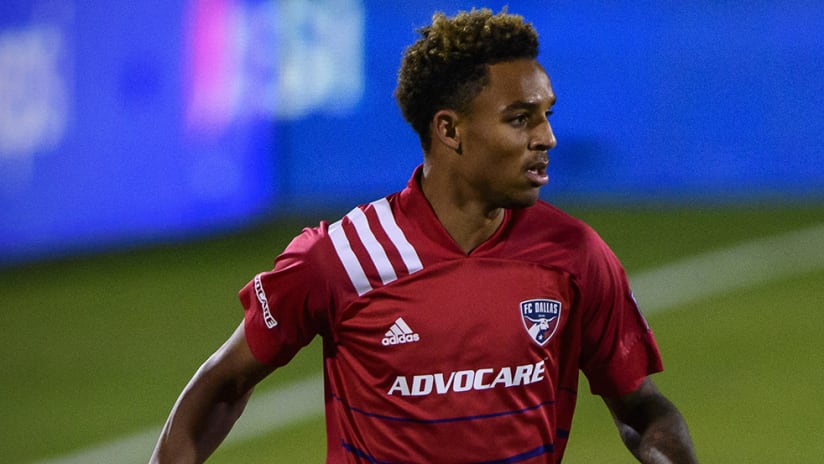There are a few of ways to look at D.C. United's signing of Ian Harkes on Monday. The central midfielder and son of United & USMNT legend John inked a Homegrown deal after leading Wake Forest to the ACC championship, and then to the NCAA title game before they fell in penalties to a ruthlessly pragmatic Stanford side. Along the way he won the MAC Hermann award as college soccer's best player.
Version 1: Harkes is a product of the DC Academy, so this signing was to be expected. The "present" of MLS is more and more the future of MLS, as the whole Development Academy infrastructure has been running for nearly a decade now, and kids who started as pre-teens are coming online as full-grown adults with significant, high-level youth experience. Harkes -- like Jordan Morris last year -- is a product of that environment, and represents the baseline accomplishment in terms of what should be expected from MLS teams who've prioritized youth development on one level or another.
In this case, then, it's not so much about moving forward as it is about not falling behind.
Version 2: United have had their successes with Homegrowns, of course. Bill Hamid is, when healthy, the best 'keeper in the league, and Andy Najar is a crucial piece of both a UEFA Champions League team and the Honduras national team. But since inking those two guys most of the D.C. Academy products have tended toward "useful squad player" rather than "high-level difference-maker."
Sixteen-year-old d-mid Chris Durkin, the captain of the US U-17s who was signed last summer, may change that, and there's a decent enough chance that someday we'll look back and regard that signing as the one that signaled real intent on D.C.'s part.
But Harkes is ready to step in now, right this instant. So for the time being, he's the best "hey, this is about more than not falling behind, it's about moving forward" example.
And because of our (Americans & Canadians) tendency to downplay the talent of domestic players, I need to make this clear: Ian Harkes is really good. Take a brief look:
Like father, like son. @dcunited sign Ian Harkes to a Homegrown Player contract: https://t.co/OwjEySR4IJ#DCUhttps://t.co/gYDRam0rAb
— Major League Soccer (@MLS) January 23, 2017
They know what they're getting by signing him, how he slots into their midfield, and what jobs he can do on the pitch. He is in the same talent stratosphere as Morris, Jack Harrison and Keegan Rosenberry, last year's outstanding trio of rookies. He's in the same talent stratosphere as Kellyn Acosta and Cristian Roldan, fellow 1995-born central midfielders who are starters for two of the best teams in MLS. He is better than either of the central midfielders picked in the top 10 of this year's SuperDraft.
Having a talent like that coming through the academy made it so that D.C. didn't have to go overseas to find their on-field answers, and made it so they didn't have to wheel-and-deal in the draft. Rather, they crafted the answer slowly over time, and are set to reap the rewards.
This is a massive step forward for MLS as a league.
Version 3: Those clips above are mostly of Harkes scoring goals or being decisive on the ball in the attacking third. Fair enough -- he can do that a bit, and showed it throughout his career with the Demon Deacons. He spent most of that career as a No. 8, a metronome who did a lot of everything from winning the ball back, to marking opposing playmakers, to late-arriving attacking runs into the box, to dictating everything about the tempo of the game, to playing defense-splitting through-balls.
All the while, he was targeted by opposing teams with the sort of overly physical play that's common to college soccer. Here's a message I got from a friend after Harkes utterly demoralized a very good Clemson team in the ACC title game, which Wake won 3-1:
"Don't know if TV caught it but someone got into him off the ball and he grabbed the guy and let him know who was boss. Not in a red card kind of way either, knew exactly what he was doing, what the kid tried to do and just dominated him enough to show him it wasn't going to work."
That attitude and toughness and intelligence may go a long way toward explaining why reports out of United camp suggest they see Harkes as more of a d-mid as a pro than at his more familiar central midfield spot. He'd presumably come into camp at No. 2 on the depth chart there behind Marcelo Sarvas, and nobody should be shocked if he's worked his way into the starting XI by, let's say, mid-April.
Version 4: Benny Ball is dead. Long live Benny Ball!
D.C. were the highest-scoring team in the league from August onward, and Harkes is a perfect fit for that ethos in any midfield spot, because even if he's playing at d-mid he's always looking to create something in the attack.
That goal, from the aforementioned win over Clemson, came directly after he won a 50/50 ball at midfield.
Later in the half, look at this:
Ian Harkes y'all... pic.twitter.com/Mi8gqWAIyv
— Matthew Doyle (@MLSAnalyst) November 13, 2016
I love how early he sees the run, but how patient he is in setting it up. That's a man who understands the value of a back-pass or a square ball, and neither of those is remotely meant in a snarky way. In the modern game backlines are always trying to step up and play an offside trap, so the ability to sucker them into those kinds of movements is crucial.
And then obviously the flair receiving the ball and vision to lay it on a platter speak for themselves. What could I possibly add to that?
D.C. may not have imported huge names from overseas this winter, but that doesn't mean they failed to make a big signing. Beating out multiple European suitors for Harkes was a coup, so first and foremost I think that's the way United fans should look at today's announcement. The other versions are just commentary.












